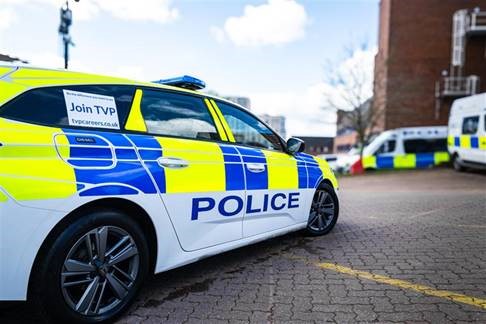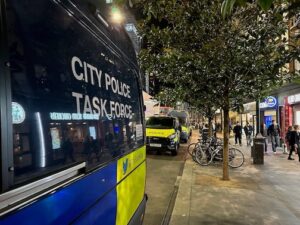My latest ride along came out the back of a conversation about Police Friendly and Metfriendly’s Police Family Finance Index.
As well as probing the insights highlighted by our research, the award-winning journalist Carla Delaney was asking me about the role officers play in our lives day-to-day, so I shared some of my experiences from previous ride alongs. Fast forward two months, and Carla and I were in Thames Valley Police’s (TVP) Buckinghamshire Local Command Unit (LCU) at the invitation of Chief Super. Emma Burrough’s attending the Incident and Crime Response (ICR) team briefing, before heading out with some of the officers from High Wycombe station.
Despite being on several ride alongs over the last four years, this was my first with an Incident and Crime Response team. For the non-police readers of this blog, ICR is the first response element of policing: when someone calls for police support, in most cases it will be directed to a local ICR. This means the ICR unit will be exposed to a huge range of calls, making it an ideal training ground for new officers; most officers will spend at least the first couple of years of their post-training service in an ICR team.
During the 8-hour shift at High Wycombe, Insp. Oliver Brixey asked his team of six Police Constables to host us, which was nearly every officer on that ICR shift at High Wycombe that day. Why so many? The second call out (which came in about 90 mins after the shift started) was to a man making credible threats to harm himself. The mental health element involved meant two needed to take him to hospital for assessment and support. The resulting processes meant they were out of action for the rest of the shift. I haven’t shared details of the other call-outs due to the sensitive nature of them, but I can say that I was impressed with the professionalism, compassion and skilled use of judgement demonstrated by the officers. Most of that shift for nearly all the officers was taken up by attending incidents involving mental health issues, some of which led to elements of criminality, some didn’t. Police Chiefs have been saying for a while that much of their officers’ time is spent on mental health-related issues, airing concerns about the unsuitability of officers to deal with such medical crises beyond containment of the person. It was interesting to see just how much of a front-line shift was “lost” to policing in this way. As tempting as it is to focus on that element, the merits of using people trained in law enforcement to handle people suffering with medical conditions is a subject there are better-qualified people than me to write about, so I will concentrate on my own areas of expertise and draw out some of the findings in our recent research that were reinforced by the officers we went out with.
Our Police Family Finance Index has identified some significant concerns with police officers with fewer than five years’ service, which was the case for all the officers we accompanied except one. It is worth having in your mind that, at this point, officers have become particularly “useful”. With a couple of years’ experience under their belts, they have developed real skills and judgement but still have years of valuable service ahead of them.
So… what are officers with fewer than five years’ service telling us?
- A quarter of them are considering leaving the police for financial reasons, despite loving the job.
- Two thirds are considering stopping paying into their pension.
The police pension is very good: it is one of the few pensions left that is based on what you are earning in the run-up to retirement rather than how much you pay in, but the contribution officers make from their own pay is c15% of their salary, which they really notice each month, even though the starting pay is pretty good at just over £30k. Not only would opting out of the pension be a terrible thing for their own finances in the future, but it is an interesting bellwether for retention problems in the future: the police pension has been a terrific tool for keeping the most experienced officers in the job. If this is lost, retention of the most experienced officers will be much harder in the future and society much poorer as a result.
- Nearly a quarter have skipped meals because of lack of money.
- 71% plan to do more overtime and 18% plan to take a second job to make ends meet.
Now, the officers I spoke to all loved the job they were doing, but that isn’t the case across all officers with 5 years’ service. Job satisfaction drops from 70% after 1 year to 32% after five. Equally telling is that family support almost halves in the same period, dropping from 60% to 34%.
All the officers talked about how constrained their money was; one said they could only do the job as their partner was the main breadwinner and was willing to support emotionally and financially; another admitted to reliance on credit cards by the end of every month. A PC’s salary will increase to about £50k by the end of their 7th year in service – a good salary by any measure – but cost of housing in the southeast of England is very high and the public transport system – already pretty scant in Thames Valley – is largely non-existent if your shift finishes in the middle of the night.
I don’t think we should expect the officers who put themselves between us and danger to go hungry or take a second job to enable them to do so.
I don’t think they should rely on the good will of family members or expensive credit card debt to get by.
And I know it does not make good business sense to keep feeding a recruiting machine only to lose people when they are particularly effective – it costs c£100k to recruit and train a new officer and pay them for the first two years.
I know there is no bottomless pit of money available, but I believe we need to help the police family to be financially secure, and I am proud of the role Police Friendly and Metfriendly plays to highlight these problems.






